Billions of pounds for tax cuts pledged by Tory leader rivals should be spent on vulnerable children, commissioner says
'The cost of social chaos is immense,' Anne Longfield warns

Your support helps us to tell the story
From reproductive rights to climate change to Big Tech, The Independent is on the ground when the story is developing. Whether it's investigating the financials of Elon Musk's pro-Trump PAC or producing our latest documentary, 'The A Word', which shines a light on the American women fighting for reproductive rights, we know how important it is to parse out the facts from the messaging.
At such a critical moment in US history, we need reporters on the ground. Your donation allows us to keep sending journalists to speak to both sides of the story.
The Independent is trusted by Americans across the entire political spectrum. And unlike many other quality news outlets, we choose not to lock Americans out of our reporting and analysis with paywalls. We believe quality journalism should be available to everyone, paid for by those who can afford it.
Your support makes all the difference.Billions of pounds of tax cuts promised by the Tory leadership rivals should instead go on mending "broken childhoods", the Children's Commissioner for England has urged.
Anne Longfield called for an extra £10bn a year of investment into services for young people from the future prime minister, as a new report estimates that one in five children in England - 2.3 million in total - are growing up with a vulnerable family background.
Of these, support is “unclear or non-existent" for 1.6m vulnerable children and 830,000 are “invisible” to services, the report from the commissioner’s office found.
Fewer children are receiving help, with a quarter of the amount councils spend on children now going on only 1.1 per cent of children who need acute and specialist services, the report states.
In one council, just 10 were costing a fifth of the entire children's services budget.
Children from vulnerable backgrounds include those whose parents suffer with mental illness, addiction problems or domestic abuse issues.
Many of these children start school significantly below the expected level of development and their progress is lower on average, increasing the likelihood they will leave school without qualifications.
This group is also more likely to have Special Educational Needs (SEN) and mental health issues, which can make them more susceptible to gang violence.
Ms Longfield will argue that Boris Johnson’s income tax plans and Jeremy Hunt’s corporation tax plans, estimated to be £9bn and £13bn a year, should be spent on vulnerable children.
In a speech to the launch of the report, Ms Longfield is expected to say: “I want to challenge the contenders for the Conservative leadership and the keys to Number 10 what they intend to do about this. I've heard them talk about runways, immigration, Islamophobia, even model buses - but not about children. They should.”
She will also argue that at least £10bn per year is needed “to fix this broken system”.
She will added: "It might be more, it might be less, but what I do believe is it'll save money in the long term. The cost of social chaos is immense."
The report from the commissioner's office also reveals that the rate of permanent exclusions from school increased by more than 50 per cent between 2012-13 and 2016-17, while the rate of children experiencing a fixed term exclusion increased by a fifth over the same period.
Meanwhile, the proportion of children in custody who were sentenced for a violent offence rose from 21 per cent in 2012 to 40 per cent in 2018, the report states.
More investment is needed in early years initiatives, Sure Start children’s centres, family hubs and parenting support, Ms Longfield is expected to say.
Paul Whiteman, general secretary of school leaders’ union NAHT, said: “Not only are school budgets at breaking point, there have been severe cuts to health and social care provision. Schools are left struggling to meet the needs of our most vulnerable pupils."
Cllr Anntoinette Bramble, chair of the Local Government Association’s (LGA) children and young people board, said: “The Children’s Commissioner is absolutely right that investment in our most vulnerable children is vital. Early intervention services such as children’s centres and family support services play a crucial role in supporting children and helping to prevent problems becoming more serious later on.”
But she added that children’s services are at a “tipping point” as a result of high levels of demand for support and cuts in central government funding.
“Without more investment, councils will find it increasingly difficult to give children and families the support they need to thrive,” Ms Bramble said.
A Government spokesperson said: “It is a measure of a strong society how we support the most vulnerable people in this country. We are making record investments in education and in children’s services to help improve outcomes and support young people to overcome the challenges they face."
They added: “We know the compounding impact disadvantages and vulnerabilities have on children’s outcomes but also recognise council and school budgets are under pressure. That’s why we are providing £2.4bn each year to support disadvantaged pupils through the pupil premium and gathering as much evidence as possible on what works to support those most in need ahead of the Spending Review.”
Join our commenting forum
Join thought-provoking conversations, follow other Independent readers and see their replies
Comments